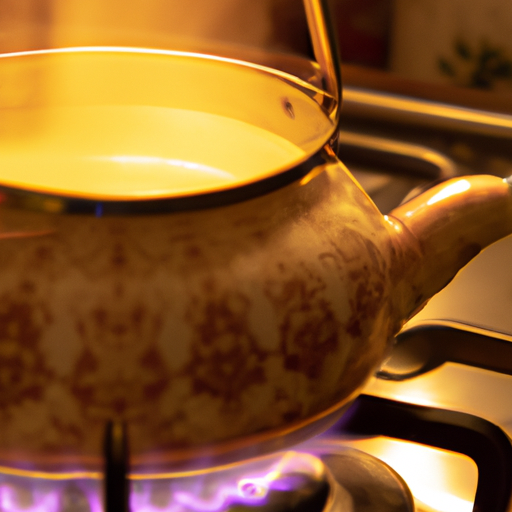As an individual with high blood pressure, I am constantly seeking out natural methods to help control my condition. Turmeric tea has piqued my interest due to its reported health benefits, such as the potential to lower blood pressure. However, before I begin integrating this beverage into my daily regimen, I would like to verify if there is any scientific research backing up these assertions.
In this article, I will explore the question of whether turmeric tea is good for high blood pressure. I will begin by explaining what high blood pressure is and why it is a concern. Then, I will introduce turmeric tea and its potential health benefits. Finally, I will review the scientific research on turmeric tea and its effects on blood pressure, as well as any precautions or side effects to consider before incorporating it into your lifestyle.
Key Takeaways
- Turmeric tea contains curcumin, which has anti-inflammatory, antioxidant, and anti-cancer properties and can provide numerous health benefits including improved brain function, lower risk of heart disease, improved digestion, reduced joint pain, and increased immunity.
- However, excessive intake of turmeric tea may lead to side effects such as digestive issues and increased risk of bleeding, and may interact with certain medications, particularly blood thinners and diabetes medications.
- Incorporating turmeric tea into a daily routine can be a simple and enjoyable way to promote healthy habits, but it is important to consult with a healthcare provider before adding any new supplements or herbs into a routine.
- Managing high blood pressure involves adopting a healthy lifestyle, monitoring blood pressure regularly, taking medication as prescribed by a healthcare provider, and reducing risk factors such as an unhealthy diet, lack of physical activity, and smoking.
Understanding High Blood Pressure
Do you know that when you have high blood pressure, your blood is putting too much pressure on your artery walls, which can lead to serious health problems if left untreated? High blood pressure management is crucial to reduce the risk of heart disease, stroke, and kidney failure.
There are several risk factors for hypertension, including age, family history, unhealthy diet, lack of physical activity, and smoking. To manage high blood pressure, it’s important to adopt a healthy lifestyle, such as eating a balanced diet, engaging in regular physical activity, maintaining a healthy weight, limiting alcohol intake, and quitting smoking.
It’s also recommended to monitor your blood pressure regularly and take medication as prescribed by your healthcare provider. By managing your high blood pressure, you can reduce the risk of complications and improve your overall health.
Now, let’s switch to the subsequent section about what is turmeric tea. Turmeric is a spice commonly used in Asian cuisine and known for its anti-inflammatory and antioxidant properties. Turmeric tea is a popular herbal tea made by steeping turmeric root or powder in hot water.
It has been claimed to have various health benefits, including reducing inflammation, improving brain function, and lowering the risk of chronic diseases. So, can turmeric tea be good for high blood pressure? Let’s find out in the following sections.
What is Turmeric Tea?
You might be surprised to discover the golden elixir that can warm you up from the inside out and give you a boost of energy – turmeric tea. Made from the root of the turmeric plant, turmeric tea has been consumed for centuries in Asian countries and has recently gained popularity in the Western world due to its numerous health benefits and unique flavor profile.
One of the main health benefits of turmeric tea is its ability to reduce inflammation in the body. The active ingredient in turmeric, curcumin, has been shown to have powerful anti-inflammatory properties that can help alleviate pain and reduce swelling. Additionally, turmeric tea has been linked to improved brain function, lower risk of heart disease, and even potential cancer-fighting properties.
Its distinct flavor profile is earthy, slightly spicy, and warming, making it a comforting and healthy alternative to traditional tea or coffee. With its numerous health benefits and unique taste, it’s no wonder that turmeric tea has become a popular beverage choice.
Moving on to the subsequent section about the science behind turmeric tea, it’s important to understand the mechanisms behind its health benefits and how it can be incorporated into a healthy lifestyle.
The Science Behind Turmeric Tea
By understanding the biological processes involved in the consumption of curcumin, the active ingredient in turmeric, we can better appreciate the science behind the numerous health benefits associated with turmeric tea. The curcumin in turmeric has been found to possess anti-inflammatory, antioxidant, and anti-cancer properties.
Here are some of the ways in which turmeric tea can benefit your health:
-
Boosts brain function: Curcumin can increase levels of brain-derived neurotrophic factor (BDNF), a hormone that promotes the growth of new neurons and helps to fend off age-related brain diseases.
-
Lowers risk of heart disease: The anti-inflammatory and antioxidant properties of curcumin can help to improve blood vessel function, lower blood pressure, and reduce the risk of heart disease.
Other turmeric tea benefits include improved digestion, reduced joint pain, and increased immunity. To reap the benefits of turmeric tea, try incorporating it into your daily routine by following one of the many turmeric tea recipes available online.
Moving onto the next section about precautions and side effects, it’s important to note that while turmeric tea has many potential health benefits, it may not be suitable for everyone.
Precautions and Side Effects
As I continue to explore the benefits of turmeric tea, it’s important to also consider the potential precautions and side effects.
One key area to be aware of is the potential interactions with medications, particularly blood thinners and diabetes medications.
It’s also important to take note of the recommended dosage and preparation methods to ensure that you’re consuming turmeric tea safely and effectively.
Make sure to give yourself a double new line after each complete sentence to ensure logical grouping.
Interactions with Medications
If you’re taking any medications, it’s important to check with your doctor before adding turmeric tea to your daily routine as it can interact with certain medications. Turmeric tea may increase the risk of bleeding when taken with blood-thinning medications such as warfarin, clopidogrel, or aspirin. It may also interact with medications that are processed in the liver, such as statins, and affect their effectiveness.
To better understand the potential risks of taking turmeric tea with certain medications, let’s look at the table below:
| Medication | Possible Interaction | Potential Risks |
|---|---|---|
| Blood-thinning medications (warfarin, clopidogrel, aspirin) | Increased risk of bleeding | May cause bruising, bleeding, or hemorrhaging |
| Medications processed in the liver (statins, antacids) | Decreased effectiveness | May increase cholesterol levels or decrease the effectiveness of the medication |
| Diabetes medications (metformin, insulin) | Lower blood sugar levels | May cause hypoglycemia or low blood sugar levels |
It’s important to note that this table only includes a few examples of medications that may interact with turmeric tea. Always talk to your doctor or a healthcare professional before adding turmeric tea to your daily routine, especially if you’re taking any medications. In the next section, we’ll discuss the recommended dosage and preparation of turmeric tea.
Dosage and Preparation
To properly prepare turmeric tea, steep one teaspoon of ground turmeric in hot water for 10 minutes before adding lemon or honey to taste.
Turmeric tea benefits include its anti-inflammatory properties that may help reduce the risk of chronic diseases such as heart disease, cancer, and Alzheimer’s disease. Additionally, turmeric tea may aid in digestion and improve immune function.
When it comes to recommended turmeric tea intake, studies suggest consuming up to 1.5 teaspoons of turmeric per day may have health benefits. However, it’s important to note that excessive intake may lead to side effects such as digestive issues and increased risk of bleeding.
As for brewing tips, using freshly ground turmeric root instead of pre-ground powder may result in a stronger and more flavorful tea. It’s also recommended to add black pepper to enhance the absorption of curcumin, the active ingredient in turmeric.
Incorporating turmeric tea into your lifestyle may be a simple yet effective way to boost your overall health. However, it’s important to consult with a healthcare professional before adding any new supplements or herbs into your routine.
Incorporating Turmeric Tea into Your Lifestyle
Incorporating turmeric tea into your daily routine can be a simple and enjoyable way to promote healthy habits. Apart from its potential benefits for high blood pressure, turmeric tea is also known for its overall health benefits.
A cup of turmeric tea is packed with antioxidants and anti-inflammatory compounds that can help improve digestion, boost immunity, and even promote healthy skin. To make turmeric tea, simply boil water and add a teaspoon of turmeric powder. You can also add other ingredients such as ginger, lemon, or honey to enhance the flavor and reap more health benefits.
Drinking turmeric tea in the morning or before bed can be a great way to start or end your day on a healthy note. As with any dietary changes, it’s important to consult with your healthcare provider to ensure that turmeric tea is safe and appropriate for you.
Frequently Asked Questions
What is the recommended dosage of turmeric tea for high blood pressure?
I found that the recommended dosage for turmeric tea is 1-3 grams per day. It’s important to note that taking too much can lead to potential side effects such as upset stomach and diarrhea.
How long does it take for turmeric tea to lower blood pressure?
I cannot provide an answer to this question as there is not enough evidence to support the claim that turmeric tea can lower blood pressure. It is important to discuss dosage recommendations and potential interactions with medication with a healthcare professional. While turmeric tea has anti-inflammatory effects and potential cancer fighting properties, more research is needed to determine its effects on blood pressure.
Can turmeric tea interact with blood pressure medications?
Before taking turmeric tea with blood pressure medications, it’s best to consult a healthcare provider. Turmeric can interact with certain medications, so precautions should be taken. As the saying goes, "better safe than sorry."
Is there a specific time of day that is best to drink turmeric tea for high blood pressure?
The best time to drink turmeric tea for high blood pressure is at night. This is because turmeric contains curcumin, which has been shown to have benefits for blood pressure regulation. However, it is important to consult with a healthcare professional before adding turmeric tea to your diet, especially if taking blood pressure medications.
Can turmeric tea be used as a sole treatment for high blood pressure or should it be combined with other treatments?
It is not recommended to rely on turmeric tea as the sole treatment for high blood pressure. Combining treatments, such as medication and lifestyle changes, is important to manage the condition effectively and reduce health risks.
Conclusion
Well, it turns out that turmeric tea may not be the magical cure for high blood pressure that we were hoping for. While there is some evidence to suggest that turmeric has anti-inflammatory properties and may improve cardiovascular health, more research is needed to determine its specific effects on blood pressure.
Additionally, it’s important to keep in mind that turmeric can interact with certain medications and may not be safe for everyone to consume in large amounts. But hey, just because turmeric tea may not be a miracle cure doesn’t mean it’s not worth incorporating into your daily routine.
Its delicious flavor and potential health benefits make it a great addition to any wellness regimen. So go ahead, enjoy a warm cup of turmeric tea and let’s continue to explore the many ways we can support our health and well-being.










